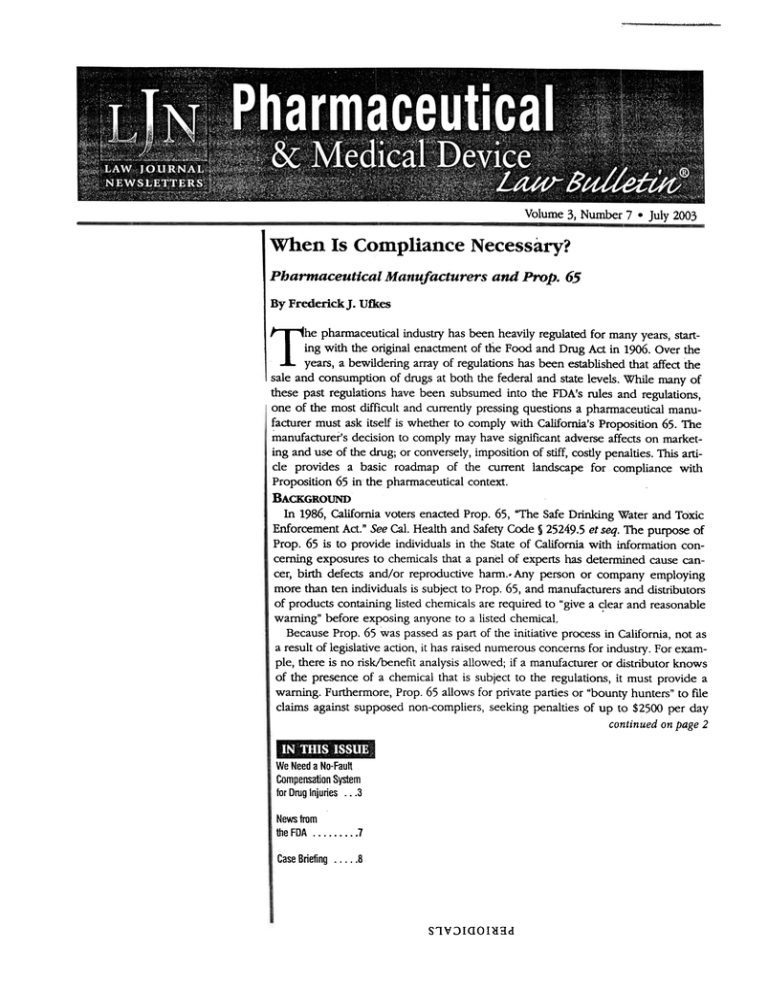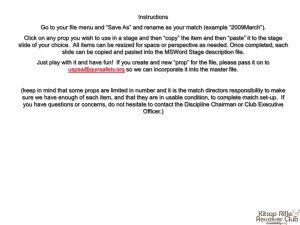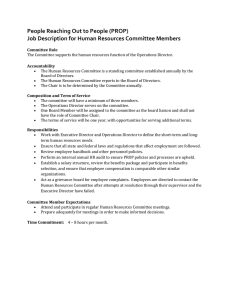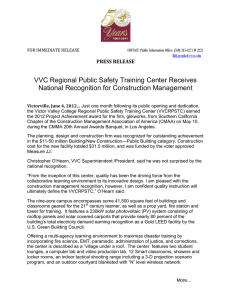When Is Compliance Necessary?
advertisement

Volume 3, Number 7 .July 2003 When Is Compliance Pharmaceutical By Frederick]. Necessary? Manufacturers and Prop. 65 Ufkes T he pharmaceuticalindustty has been heavily regulated for many years,starting with the original enactmentof the Food and Drug Act in 1906. Over the years, a bewildering array of regulationshas been established that affect the sale and consumption of drugs at both the federal and state levels. While many of these past regulations have been subsumed into the FDA's rules and regulations, one of the most difficult and currently pressing questions a pharmaceuticalmanufacturer must ask itself is whether to comply with California's Proposition 65. The manufacturer's decision to comply may have significant adverse affects on marketing and use of the drug; or conversely,imposition of stiff, costly penalties. This article provides a basic roadmap of the current landscape for compliance with Proposition 65 in the pharmaceuticalcontext. BACKGROUND In 1986, California voters enacted Prop. 65, "The Safe Drinking Water and Toxic EnforcementAct." SeeCal. Health and SafetyCode § 25249.5et seq.The purpose of Prop. 65 is to provide individuals in the State of California with information concerning exposures to chemicals that a panel of experts has determined causecancer, birth defects and/or reproductive harm.-Any person or company employing more than ten individuals is subjectto Prop. 65, and manufacturersand distributors of products containing listed chemicalsare required to "give a c;learand reasonable warning" before exposing anyone to a listed chemical, BecauseProp. 65 was passedas part of the initiative process in California, not as a result of legislative action, it has raised numerousconcerns for industty. For example, there is no risk/benefit analysisallowed; if a manufacturer or distributor knows of the presence of a chemical that is subject to the regulations, it must provide a warning. Furthermore,Prop. 65 allows for private parties or "bounty hunters" to file : claims against supposed non-compliers, seeking penalties of up to $2500 per day I continued We Needa No-Fault Compensation SystemI. lor DrugInjuries. ..3 Newsfrom the FDA 7 CaseBriefing 8 Sl";)IaOI~'ild on page 2 Compliance continued from page 1 per violation, as well as the payment of attorneys fees. RESOONsmn.ny TO CoMPLY Prop. 65 is applicable to pharmaceutical manufacturers. See Cal. Health and Safety Code § 25249.6. They, likewise, are required to provide a "clear and reasonable warning" unless they are somehow otherwise exempted from Prop. 65. The California Health and Welfare Agency (CHWA), the agency initially designated to administer Prop. 65, adopted an implementing regulation (the Regulation) stating: "for prescription drugs, the labeling approved or otherwise provided under federal law and the prescriber's accepted practice of obtaining a patient's informed consent shall be deemed a clear and reasonable warning." Cal. Code Reg. tit. 22, Section 12601(b)(2. Because there is an existing comprehensive federal regulatory scheme concerning warnings on drugs promulgated by the FDA, the conflict for drug manufacturers is obvious: FDA regulations require a detailed review and approval process for the information provided in package inserts and on labeling for prescription drugs. The FDA regulations require similar information, particularly relating to safety, on any advertising for prescription drugs. Further, once the FDA approves a label, no changes may be made without its prior approval. Any unapproved FrederickJ. Utkes is a partner at the Los Angeles Office of Kirkpatrick & Lockhart, LLP, and has regional and national counsel experience in product liability litigation. His experience includes serving as trial counsel in numerous toxic tort casesrepresenting Fortune 500 companies. Ufkes litigatesa wide range of issuesaffecting the chemical and pharmaceutical industry, including defending claims of violations of Proposition 65. He would like to thank Nicole Lee, an Associate at Kirkpatrick & Lockhart, LLP for her assistancein the preparation of this article. changes to the label may render the product "misbranded" under federal law and subject the manufacturer to substantial filles and penalties. See Cantor v. Warner Lambert Company, 99 Cal.App. 4th 780 (2002). & Medical Device Law- Bu~ ~ THE OTC CoNTEXT Prop. 65 complaints have been filed both by the California Attorney General'sOffice as well as by private attorneys general in numerous cases involving over-the-counterdrugs and other medical products. For example, manufacturers of dental amalgam have fought a long, losing battle with the State of California concerning information provided to dental patients as to the presenceof mercury in dental amalgam. Recently,a private attorney general initiated action againsta manufacturer of an OTC nicotine patch for the cessation of smoking. In Dowhal v. SmithKline Beecham Consumer Healthcare, Cal.App.4th8 (2002),the Court of Appeals overturning the trial court's entry of summaryjudgment on behalf of the defendants,determined that the Modernization Act of 1997 had a savings clausewhich explicitly provided that Prop. 65 and federal law were not in direct conflict. This decision has recently been depublished, as the California Supreme Court has granted review. Dowhal v. SmithKline Beecham Consumer Healthcare, No. S109306,(2002 WL 1486578)(October 23, 2002). Not only is Smith Kline Beecham challenging the Dowhal court's decision, but the FDA likewise is challenging it, arguing that it specifically rejected the proposed Prop. 65 warning as scientifically unreliable and one that might dissuade pregnant women from trying to stop smoking, a result that would not be in the interest of good public health. The FDA argues that it carefully considers the warnings that it requires on products and, based on its expertise, has mandated the precise warning language that it concludes provides all material information relating to safety. The FDA has stressed that strict compliance with Prop. 65 may result in a narrow focus that disregards entirely the product's continued on page 4 Pharmaceutical& Medical Device uw Bullet ..S8IIa~ .JaI~G._. MAlAGI':EDIT1IR .. .WlI""" MARKET1':D1Ra:TOR .GIll s..-.stI1. Mpalsk .till.. C.1'IeIII-IIrkI lGIIs F.18I8t11 Till"" C8II1I1I1, ~, MA WUII- AUaItl DAnEYJ.WR IV .T_s.ursUP DtAIEE. lIFlOI .GlbbOlS, DeI~, DallI, lI"'OId, YA Griffl'..' , YlC.-Jooa,P.C. law YIlt COllfEi A. LDW .QaarIes , BlIdyStreIcbl8Il UP STEPIIfI B.MAEIIUS .Faley& Wdner Tu...n,AZ WasIIlnltGI, DC .PonIo, 1181." , ~an, P.C. Morristown, IIJ JAICEF.MUlll;A1 .Mullilla & Blah-. San DIBIO .Klrkpatrtck & Lockhart, LlP WasIIlnltoa, nc .GCGC unIClUons MBI1fIlB, IY almTT 80 PO1J.ACK ..Pullmla& CORIIBY, PPC Hartford, CT KEVINQUINlEY .MEDMARC Insurance Group VIY~I M. QU'II .lllon _odrLlP BERT W. REII .Wlley,RBln& FIBldlnl,LlP Chantilly, VA Buffalo, IY Washlnltan, DC .StbIlIBr,Osbourn & BamBs LaulmllB,KY VANISINGHAL .58lal, McCanlbrldle, Siller & Mahaney LIU. ChlCilO .TempiB University Philadelphia JAMESM. W1100 ..Crosby,HBlfBr,Roach& Mar Los AnlBIBS Ptlarmoceutlcal & ModlcalDo11ce law .ullaIJ~ (1S511538-1692) Is publlshod bylaw Journal NewsllII8lS.0 divisionof Amarlcan Lawyar Media.0 2003IlP IPCcxnpany. All rtgb1s rasarvad.10 rvproductlon of anyportl.. oftills issua~ allowedwI1IIoat -.pannlssl.. from!be publlsbar. Tala~ilooe: !8OOlm1!16' ~Itortala-mall: Phanaaceutlcal& Medical Dnlcelaw Bulletin ~Q-24Z Pertodlcals Postage Pendlagat Philadelphia, PA POSTMASTER: Sendaddrosschanges to : 1611 JFK Blvd.,Sulls 1150, Ptlllnliphla, PA 11103 Publishedby: LawJournalNewslett8rs 1617JFKloul8Y8rd, 5UI181750, Philadelphia,pa 19103 July 2003 Compliance continued from page 2 significance in reducing known health risks, which the FDA takes into consideration when approving warnings and labeling. PREscRlPnON DRUGS The rules to be applied to prescription drugs are more precise than for OTC products. Not only do the enabling regulations to Prop. 65 provide a "safe harbor," but recent trial court decisions have determined that to the extent Regulation 12601(bX2) does not provide for an absolute safe harbor, the imposition of Prop. 65 liability for prescription drugs is preempted by federal law. In State of California v. Alpbanna USPDInc., CaseNo. 992915,the San Francisco Superior Court granted summary judgment on behalf of Alpharma against a claim by the Attorney General that Alpharma violated Prop. 65 in the labeling for its Lindane shampoo and lotion. The Attorney General sued defendant Alpharma, claiming that there were chemicals in Lindane shampoo that were "known to the people of the State of California to cause cancer." Alpharma moved for summary judgment on the grounds that its Lindane products contained a label approved by the FDA. The trial court agreed with Alpharma, finding that its only obligations under Prop. 65 were satisfied by the FDA-approved label, thimersosal-containingvaccines,and together with the "prescriber's thimerosal manufacturers. Further, the court determined that any impoaccepted practice of obtaining a patient's informed consent." The sition of Prop. 65 liability in the context of prescription drugs would subcourt did not reach the issue of implied or expresspreemption. stantially interfere with and impede the FDA's responsibilities to ensure A very recent California trial court that safe and efficacious drugs are decision, however, specifically deteravailable to the consuming public. mined that Prop. 65, to the extent that it requires additional information Judge Chaney held that the FDA requirements govern all product other than the FDA-approved label information materials relating to preand package insert, is pre-empted.In scription drugs, including advertisThe Vaccine Cases,JCCP No. 4246 ing, brochuresand postings,whether (Los Angeles Superior Court), plainphysically attached to the product or tiffs made claims, inter alia, for vionot Plaintiffs have recently filed a lation of Prop. 65. Plaintiffs claimed notice of appeal. that they themselvesor their children were poisoned with thimerosal-conCoNCLUSION Clearly, Prop. 65 is a trap for the raining vaccines, causing personal injury and violating Prop. 65. They unwary. Substantial penalties and claimed that thimerosalcontainsmerattorneysfees can be collected either cury, one of the listed chemicals on by the stateAttorney General or by a the Governor's"List, and that thereprivate litigant acting as a private fore there was a requirement that attorney general under the public usersbe warned of reproductive toxbenefit portion of Prop. 65. However, icity. However, the defendants sucrecent trends seem to indicate a cessfully challenged the plaintiffs' retrenchment from strict compliance claim. Sustaininga demurrer without with Prop. 65, especially in the pharleave to amend on the Prop. 65 claim maceutical context. The California Supreme Court's acceptance of (Master Complaint No.3), Judge Victoria G. Chaney determined that Dowhal, and recent trial court decithe manufacturersof thimerosal and sions in Aipharma and The Vaccine thimerosal-containing vaccines were Cases, inqicate that state judges entitled to judgment in their favor on are more likely to view Prop. 65 that issue. The court determined that as impeding the FDA's regulatory provisions, and thus pre-empted by Regulation 12601(b)(2) provided an absolute safe harbor for the manfederal law. ufacturers and distributors of . c


